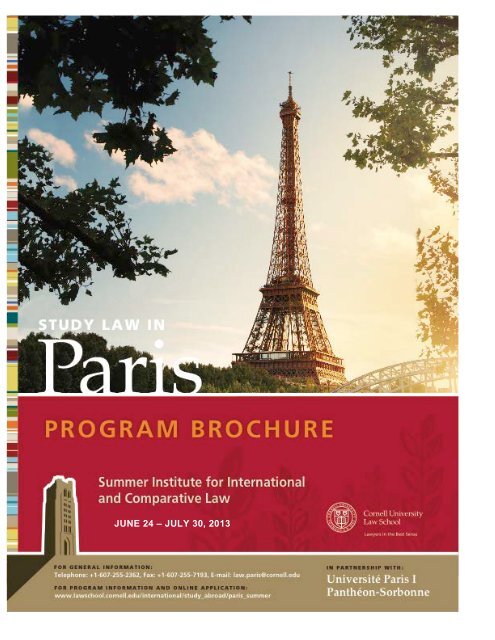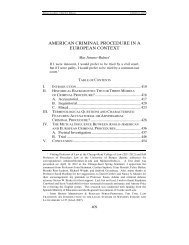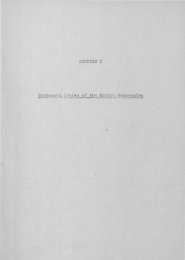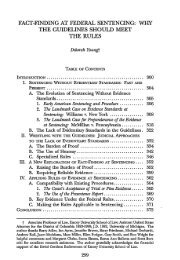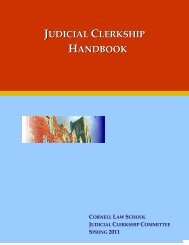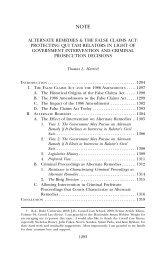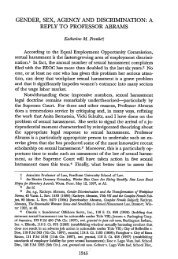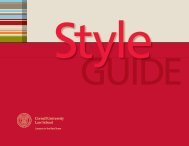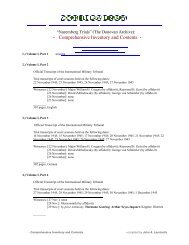JUNE 24 – JULY 30, 2013 - Cornell University Law School
JUNE 24 – JULY 30, 2013 - Cornell University Law School
JUNE 24 – JULY 30, 2013 - Cornell University Law School
You also want an ePaper? Increase the reach of your titles
YUMPU automatically turns print PDFs into web optimized ePapers that Google loves.
<strong>JUNE</strong> <strong>24</strong> <strong>–</strong> <strong>JULY</strong> <strong>30</strong>, <strong>2013</strong>
Table of Contents<br />
ABOUT THE INSTITUTE .....................................................................................1<br />
PROGRAM OF INSTRUCTION .............................................................................2<br />
COURSES ..........................................................................................................5<br />
FACULTY ...........................................................................................................7<br />
ADMISSION, TUITION, AND FINANCIAL AID .................................................... 12<br />
HOUSING, PERSONS WITH DISABILITIES AND TOTAL COST .......................... 13<br />
REFUNDS AND CANCELLATION ...................................................................... 14<br />
APPLY ONLINE ................................................................................................ 14<br />
CONTACT US ................................................................................................... 16<br />
lawschool.cornell.edu/international/study_abroad/paris_summer
About the Institute<br />
The Paris Summer Institute is a five-week academic program in international and comparative<br />
law. The Institute is cosponsored by <strong>Cornell</strong> <strong>Law</strong> <strong>School</strong> and the Sorbonne <strong>Law</strong> <strong>School</strong> at the<br />
Université Paris I Panthéon-Sorbonne. Every year, the Institute welcomes a select group of law<br />
students from around the world to study law in the heart of Paris. Students take advantage of our<br />
strong international faculty, expansive English-language curriculum, and unique cultural and<br />
professional offerings.<br />
Université Paris I<br />
Panthéon-Sorbonne<br />
provides the Summer<br />
Institute's campus.<br />
Our <strong>2013</strong> Curriculum<br />
Introduction to the <strong>Law</strong>s of Europe<br />
Comparative Corporate <strong>Law</strong><br />
Litigation in a Global Context: Selected Issues<br />
Comparative Legal Studies<br />
International Commercial Arbitration<br />
International Human Rights<br />
Introduction to the American Legal System (non-JD students only)<br />
Topics in International Intellectual Property <strong>Law</strong><br />
Beginning French<br />
Intermediate French<br />
The Institute at a Glance<br />
Students<br />
We welcome law students and lawyers from around the world. In 2012 there were 80<br />
students: two from <strong>Cornell</strong> <strong>Law</strong> <strong>School</strong>, 17 from 15 other U.S. law schools, and 61<br />
from 22 other countries: Australia, Brazil, Bulgaria, Canada, Colombia, China, Croatia, Denmark,<br />
France, Germany, Greece, Japan, Lithuania, Mexico, Norway, Paraguay, Romania, Russia, Saudi<br />
Arabia, Scotland, Singapore and Turkey.<br />
1
Faculty<br />
Our program is taught in a uniquely international and culturally rich environment,<br />
combining the excellence of <strong>Cornell</strong> <strong>Law</strong> <strong>School</strong> faculty with Sorbonne <strong>Law</strong><br />
<strong>School</strong>, of the Université Paris I Panthéon-Sorbonne and international guest<br />
lecturers. We limit enrollment to 1<strong>30</strong> students, to assure relatively small classes<br />
and to provide an opportunity for meaningful student-faculty interaction.<br />
Curriculum<br />
The Summer Institute emphasizes the study of international law and institutions,<br />
as well as U.S. and other legal systems in a comparative context. In addition to the<br />
broad range of course offerings, we provide optional non-credit French language<br />
lessons. We encourage you to devote time to developing your proficiency in French<br />
during your stay in Paris.<br />
Location<br />
Summer Institute students attend classes at the historic Faculté de droit building,<br />
and occasionally in the Sorbonne building itself, at the heart of the <strong>University</strong> of<br />
Paris, near the beautiful Jardin du Luxembourg, and in the vibrant “Quartier Latin”,<br />
the Paris home of university students for almost a thousand years.<br />
The Summer Institute sponsors private guided tours to the Palais de Justice (the site<br />
of France’s highest court in the ordinary court system), the Conseil d'État (the<br />
“supreme court” in the French administrative court system), the French National<br />
Assembly, the French Senate, and the International Chamber of Commerce’s International<br />
Court of Arbitration in Paris.<br />
Cultural Opportunities<br />
The Summer Institute also offers an extensive selection of extra-curricular tours of<br />
Paris and social events that enable students to savor “la vie parisienne.” In 2012,<br />
this included small-group evening visits to the Louvre and Orsay Museums, a<br />
"bateau-mouche" boat excursion on the Seine, walking tours of Montmartre, the Ile<br />
de la Cité, the Marais and the Luxembourg Gardens. We conclude each year with a<br />
reception at Le Cercle de l’Union Interalliée, one of the elite private clubs of Paris.<br />
Accreditation<br />
The Summer Institute is fully ABA-accredited and is an integral part of <strong>Cornell</strong> <strong>Law</strong><br />
<strong>School</strong>'s international and comparative law program. We invite you to visit <strong>Cornell</strong><br />
<strong>Law</strong>'s International web site (lawschool.cornell.edu/international) and explore what<br />
we offer on our home campus.<br />
Program of Instruction<br />
<strong>2013</strong> Summer Institute Schedule<br />
June <strong>24</strong>:<br />
June 25:<br />
June 26-27:<br />
Program Registration and Book Distribution.<br />
Orientation and Opening Reception; Introductory Lectures by<br />
Professor Mitchel Lasser, <strong>Cornell</strong> <strong>University</strong> <strong>Law</strong> <strong>School</strong>: "Introduction<br />
to the <strong>Law</strong>s of Europe"; French language classes begin.<br />
Introductory Lectures by Professor Mitchel Lasser, continued.<br />
2
June 27, 28:<br />
June 28:<br />
July 1:<br />
July 11:<br />
July 12:<br />
July 15:<br />
July 16:<br />
July 25:<br />
July 26:<br />
July 29-<strong>30</strong>:<br />
July <strong>30</strong>:<br />
Private group visits to the Cour de Cassation and the Conseil<br />
d'État, and an informal social in the Luxembourg Gardens. The<br />
introductory lectures and Cour de Cassation visits are an<br />
integral part of the instructional program of the other courses<br />
in the Summer Institute; attendance therefore is required.<br />
Add/drop deadline for the French language courses<br />
Instruction begins in individual courses.<br />
Add/Drop period.<br />
Final day of classes for first-half one-credit courses<br />
Study Day-- No <strong>Law</strong> or French classes<br />
Final exams for first-half one-credit courses.<br />
First day of classes for second-half one-credit courses<br />
Add/Drop for courses beginning in the 2 nd half only (9:00am—3:00pm)<br />
Last day for French classes<br />
Final class day and review session.<br />
Examinations*<br />
Closing reception<br />
*Please note that no examinations will be rescheduled to accommodate student travel.<br />
Course Selection Guidelines<br />
Students register for classes as a part of their initial application.<br />
There will be an add/drop period on July 1. A similar add/drop<br />
period will take place on July 16 for one-credit courses that begin in the<br />
second half of the program.<br />
Students may enroll in up to six credit hours, although we recommend a<br />
slightly lower course load. Only a small percentage of students in the past<br />
have taken the maximum number of credit hours.<br />
All courses are open to all admitted students, except Introduction to the<br />
American Legal System, which is available only to students who are not<br />
studying in a U.S. J.D. program. None of the courses require prerequisites.<br />
Class Attendance<br />
Regular and punctual class attendance, beginning on the first day of class, is<br />
required of all students. Faculty members monitor attendance and may enforce<br />
the rule by reporting the student to the Co-Director of the Summer Institute; by<br />
removing a student from the course or excluding a student from an exam (after<br />
reasonable written warning). If a student is excluded from an exam, a grade of F<br />
is entered. Students who are ill or have another valid reason for missing class are<br />
encouraged to contact the instructor directly and are required to notify the Co-<br />
Director of the Summer Institute if more than three days are missed.<br />
Course Schedules<br />
Courses are offered for either one or two semester-hours credit.<br />
Two-credit courses meet for eighteen 70-minute classes,<br />
Monday through Friday.<br />
The one-credit courses that meet in the first half of the program<br />
will be held every class day from Monday, July 1, through<br />
Thursday, July 11, with examinations on Monday, July 15.<br />
The one-credit courses in the second half of the session will meet<br />
every class day from Tuesday, July 16, through Friday, July 26.<br />
One-credit courses in the second half and all two-credit classes<br />
will have examinations on Monday, July 29, and Tuesday, July <strong>30</strong>.<br />
3
Daily Class Schedule<br />
9:00<strong>–</strong>10:10 A.M.<br />
Comparative Corporate <strong>Law</strong> (2 credits)<br />
Litigation in the Global Context: Selected Issues<br />
(1 credit; July 1-11 classes; exam July 15)<br />
International Human Rights (1 credit; July 16-26 classes)<br />
Beginning French <strong>–</strong> Section One (non-credit)*<br />
Intermediate French <strong>–</strong> Section One (non-credit)*<br />
10:25<strong>–</strong>11:35 A.M.<br />
International Commercial Arbitration (2 credits)<br />
Comparative Legal Studies (1 credit)<br />
Beginning French <strong>–</strong> Section Two (non-credit)*<br />
Intermediate French <strong>–</strong> Section Two (non-credit)*<br />
11:50 A.M.<strong>–</strong>1:00 P.M.<br />
Introduction to the American Legal System (2 credits)<br />
Beginning French <strong>–</strong> Section Three (non-credit)*<br />
Intermediate French <strong>–</strong> Section Three (non-credit)<br />
1:20 A.M.<strong>–</strong>2:40 P.M.<br />
Topics in International Intellectual Property <strong>Law</strong><br />
*Students enrolled in Beginning or Intermediate French will be able to select the class meeting time that<br />
is most convenient for them, in light of their individual schedule. Please note that it will not be possible to<br />
enroll in a French language class if enrolled in a class during each of the three morning class periods.<br />
Course Credit Information<br />
All courses, except Introduction to the American Legal System, qualify for<br />
credit toward the J.D. degree at <strong>Cornell</strong> and are recognized by most other J.D. programs in<br />
the U.S.<br />
For those students previously or subsequently admitted to <strong>Cornell</strong>'s LL.M.<br />
program, Summer Institute credits will apply toward the LL.M. at <strong>Cornell</strong><br />
(consistent with ABA accreditation requirements), and may be recognized in<br />
other LL.M. programs in the United States.<br />
Non-<strong>Cornell</strong> J.D. students should consult their dean of students or registrar to determine<br />
the amount of course credit allowed, and all J.D. students should<br />
note that it is unlikely that participation in the Summer Institute may be used<br />
to accelerate graduation; students interested in acceleration should consult<br />
their home schools to review this issue in light of ABA Standard <strong>30</strong>4.<br />
Language Instruction<br />
Non-credit instruction in Beginning French and Intermediate French are available<br />
to students, as well as to persons accompanying them. Language classes will begin<br />
during the orientation/introductory lectures week, on June 25 and 26, and continue<br />
during the period of regular classroom instruction. Beginning July 1, the schedule<br />
will include one section of both Beginning and Intermediate French during each of<br />
the three morning class periods. You will be asked to select the session you<br />
prefer as a part of the application process.<br />
Please Note: Students who enroll in a regular class during each of the three morning<br />
class periods (see, above) will not be able to enroll in a French language class. French language<br />
classes will conclude on July 25. Students in these classes receive a preference in attending dinners<br />
at Paris restaurants that are organized by the French language instructors.<br />
4
<strong>Cornell</strong> <strong>University</strong> <strong>Law</strong> <strong>School</strong> Honor Code and Examination Policies<br />
All students in the Paris Summer Institute are subject to the <strong>Cornell</strong> <strong>University</strong><br />
<strong>Law</strong> <strong>School</strong> Honor Code. In particular, all examinations are governed by this<br />
Code. All enrolled students are required to familiarize themselves with the policies<br />
contained in the Code, which can be found at: https://support.law.cornell.edu/<br />
students/forms/<strong>Law</strong>_<strong>School</strong>_Code_of_Academic_Integrity.pdf<br />
Courses<br />
Introduction to the <strong>Law</strong>s of Europe<br />
Comparative Corporate <strong>Law</strong><br />
Litigation in a Global Context: Selected Issues<br />
Comparative Legal Studies<br />
International Commercial Arbitration<br />
International Human Rights<br />
Topics in International Intellectual Property <strong>Law</strong><br />
Introduction to the American Legal System<br />
Beginning French<br />
Intermediate French<br />
Introduction to the <strong>Law</strong>s of Europe<br />
CORNELL PROFESSOR: M. LASSER<br />
This introductory series of lectures examines the origins and development of the<br />
legal systems in continental Europe and draws comparisons between these systems<br />
and the common law. It also offers an introduction to the European Union and to<br />
the European Court of Human Rights. These lectures do not carry separate credit,<br />
but attendance by all enrolled students is required, as part of the regular courses.<br />
Comparative Corporate <strong>Law</strong> (6173) (2 credits)<br />
CORNELL PROFESSOR: J. HANKS<br />
This course examines fundamental issues of corporation law and governance in the<br />
United States, the European Union and selected countries in Europe and around the<br />
world. In the first part, it considers corporate governance structures, including the<br />
roles of equity investors, creditors, employees, and other stakeholders, legal capital<br />
rules, corporate domicile, and managerial duties and standards of conduct. The<br />
second part of the course takes lessons from the first part, applying and building on<br />
them in the context of corporate takeovers. Emphasis is given to the universality of<br />
business problems in an increasingly globalized economy, the range of legal solutions<br />
to these problems, and the practical application of varying legal principles. A basic<br />
business organizations course is not a prerequisite to taking this course.<br />
Litigation in a Global Context: Selected Issues (6187) (1 credit)<br />
CORNELL PROFESSOR: B. HOLDEN-SMITH<br />
This course will introduce students to the issues that arise in private transitional litigation. Topics to<br />
be explored include judicial jurisdiction, forum selection,<br />
international arbitration, and enforcement of foreign judgments.<br />
Comparative Legal Studies (6177) (1 credit)<br />
CORNELL PROFESSORS: M. LASSER<br />
This course introduces students to the study of foreign legal systems. Focusing on<br />
Continental Europe and East Asia, it will provide a broad overview of the institutional<br />
and conceptual organization of "civil law" and other legal systems. In<br />
addition to studying different approaches to private law and procedure, criminal<br />
5
procedure, administrative law and constitutional law, the course will examine the<br />
effectiveness of assorted comparative methodologies.<br />
International Commercial Arbitration (6181) (2 credits)<br />
CORNELL PROFESSOR: J. BARCELÓ<br />
A study of arbitration as the dominant dispute resolution process for international<br />
trade and business disputes, the course addresses each of the principal stages of the<br />
arbitration process: (1) enforcing the agreement to arbitrate; (2) selecting arbitrators;<br />
(3) arbitral proceedings; (4) court enforcement of arbitral awards.The course studies international<br />
commercial arbitration as a transnational system, drawing on legislation,<br />
cases, arbitral awards, institutional rules, and treaties from all parts of the<br />
world. It stresses the two principal legal instruments unifying this field on a world<br />
scale: (1) the U.N. Convention on the Recognition and Enforcement of Foreign<br />
Arbitral Awards and (2) the U.N. Commission on International Trade <strong>Law</strong><br />
(UNCITRAL) Model <strong>Law</strong> on International Commercial Arbitration. The course<br />
also emphasizes arbitration under the rules of the International Chamber of<br />
Commerce (ICC), which is headquartered in Paris, one of the world’s leading<br />
centers of international arbitration.<br />
International Human Rights (6183) (1 credit)<br />
CORNELL PROFESSOR: M. NDULO<br />
This course examines the development and effectiveness of international law<br />
governing a state’s treatment of individuals within its jurisdiction. Topics include<br />
political and civil rights, economic, social, and cultural rights, minority rights, and international<br />
criminal law. The course will also examine different mechanisms for implementing human rights,<br />
including the UN system, treaty bodies, regional<br />
institutions, and national courts.<br />
Topics in International Intellectually Property <strong>Law</strong> (6183) (1 credit)<br />
CORNELL PROFESSOR: O. LIIVAK<br />
This course will provide an overview of the main bodies of intellectual property<br />
law with an emphasis on differences among various countries. Intellectual property<br />
can be a critically important asset to protecting and enabling a business while it<br />
can just as easily be an insurmountable liability for others. Leveraging the benefits<br />
while avoiding the pitfalls requires an understanding of the structure of each area<br />
of law. This course will give an overview of that landscape by exploring some current<br />
controversies in intellectual property with an emphasis on differing approaches<br />
among various legal systems.<br />
Introduction to the American Legal System (6185)<br />
(2 credits; non-J.D. students only)<br />
CORNELL PROFESSOR: F. ROSSI<br />
This course surveys the American legal system, with emphasis on civil litigation<br />
and the court system of the United States, including: distinctive features of the<br />
American legal system; the anatomy of a civil action; the role of lawyers and<br />
judges in the adversary system; the structure of the American Constitution; the<br />
doctrine of judicial review; jurisdiction; pretrial discovery; the jury trial and<br />
judgments; and exposure to basic principles of American tort, contract, administrative,<br />
and criminal law.<br />
6
Beginning French (non-credit)<br />
FRENCH INSTRUCTOR: C. BÉDARD-CLARET<br />
These classes are designed for students who have taken no French at all or who have<br />
taken less than two semesters at the high school level (one semester in college). There<br />
are no homework assignments and no examinations. The course includes excursions<br />
to restaurants and other outings to fully immerse students into French culture.<br />
Students may change to Intermediate French, if necessary, on or before July 1, 2011,<br />
which is also the last date to withdraw from the language class and receive a refund<br />
of the $450 fee.<br />
Intermediate French (non-credit)<br />
FRENCH INSTRUCTOR: C. CASANOVA<br />
These classes are designed for students with a year or more of French, even if<br />
taken years ago. It is not an advanced language class, however, so persons<br />
with basic competency in French might find that it is not sufficiently challenging.<br />
There are no homework assignments and no examinations. The course includes<br />
excursions to restaurants and other outings to fully immerse students into French<br />
culture. Students may change to Beginning French, if necessary, on or before July<br />
1, 2011, which is also the last date to withdraw from the language class and receive<br />
a refund of the $450 fee.<br />
Students may take a total of only two credits per class period. No one may register<br />
for more than a total of 6 credits (due to the work load, we do not recommend<br />
taking six credits; only a small percentage of students in the past have done so).<br />
Also, please note that the French classes are open to non-students, if they are<br />
accompanying an enrolled student. Arrangements may be made to enroll nonstudents<br />
in the French classes either as a part of a student’s initial application<br />
process, or at the time the program begins in Paris.<br />
Faculty<br />
JOHN J. BARCELÓ III<br />
is the William Nelson Cromwell Professor of International and Comparative <strong>Law</strong><br />
and the Reich Director of the Berger International Legal Studies Program at <strong>Cornell</strong><br />
<strong>Law</strong> <strong>School</strong>. He is also the founding director and this year (2012) a co-director of<br />
the 2012 Summer Institute of International and Comparative <strong>Law</strong>. He received a<br />
doctorate in law (S.J.D.) from Harvard <strong>Law</strong> <strong>School</strong> and a J.D. degree from Tulane<br />
<strong>University</strong> <strong>Law</strong> <strong>School</strong>. At <strong>Cornell</strong> he teaches international commercial arbitration, international<br />
trade and business law (including WTO law), and European Union<br />
law. Professor Barceló is a coauthor of International Commercial Arbitration—A Transnational<br />
7
Perspective (4th ed., 2009) (with Tibor Varady). He is also coeditor<br />
of A Global <strong>Law</strong> of Jurisdiction and Judgments—Lessons from the Hague (2002) and <strong>Law</strong>yers'<br />
Practice and Ideals—A Comparative View (1999). He has published widely<br />
in U.S. and European legal journals, especially in the field of international trade law.<br />
He was a Fulbright scholar in 1966-67 at the <strong>University</strong> of Bonn, Germany, and has<br />
taught or lectured in Argentina, China, France, Germany, Hungary, Italy, the U.K.,<br />
and Spain. He has experience as an international arbitrator. Professor Barceló was a consultant to<br />
the U.S. Department of Commerce on international trade law from 1981<br />
to 1983. He has held visiting positions at St. John's College, <strong>University</strong> of Oxford<br />
(1987); the <strong>University</strong> of Siena, Italy (1987); the Université Paris I Panthéon-Sorbonne<br />
(1996 and 1998); Pompeu Fabra law faculty in Barcelona (2002); the Bucerius law<br />
faculty in Hamburg (2004; 2007; 2010); the Munich Intellectual Property <strong>Law</strong><br />
Center (2004-2010); and the Centre for <strong>Law</strong>, Economics and Institutions at Torino,<br />
Italy (2006). He is currently a visiting professor at the Central European <strong>University</strong>,<br />
in Budapest, Hungary (since 1995).<br />
JAMES J. HANKS, JR.<br />
is a partner in the 550-lawyer firm of Venable LLP, with offices in Baltimore, New<br />
York, Los Angeles and Washington, and is an adjunct professor of law at <strong>Cornell</strong><br />
<strong>Law</strong> <strong>School</strong>. He received an A.B. degree from Princeton <strong>University</strong>; an LL.B.<br />
degree from the <strong>University</strong> of Maryland <strong>Law</strong> <strong>School</strong>, where he was an editor of the<br />
Maryland <strong>Law</strong> Review; and an LL.M. degree from Harvard <strong>Law</strong> <strong>School</strong>. During<br />
the 1967-68 term, he served as law clerk to Judge Charles Fahy of the U.S. Court<br />
of Appeals for the District of Columbia Circuit. In private practice, Professor<br />
Hanks represents publicly- and privately-held corporations and other entities in<br />
securities offerings and other financing transactions. Professor Hanks has advised<br />
buyers or sellers in more than 250 mergers or acquisitions, including many valued<br />
at more than one billion dollars. He has also represented parties in cross-border<br />
mergers and acquisitions, joint ventures, and other transactions. Professor Hanks<br />
regularly serves as independent counsel to the boards of directors of major U.S.<br />
corporations and as an expert witness in connection with major transactions, stockholder<br />
litigation, conflicts of interest, and corporate governance issues. He also<br />
advises foreign governments on revision of their corporate and securities laws. At<br />
<strong>Cornell</strong> <strong>Law</strong> <strong>School</strong>, Professor Hanks has taught courses in securities regulation,<br />
corporate counsel, and business combinations. He has also taught classes in corporation<br />
law at law schools in the United States and the Republic of South Africa<br />
and at the Institute of <strong>Law</strong> in Beijing. Professor Hanks is the author of Maryland<br />
Corporation <strong>Law</strong> and the coauthor (with former Stanford <strong>Law</strong> <strong>School</strong> Dean<br />
Bayless Manning) of the third edition of Legal Capital. He is also the author of<br />
several law review articles and is a frequent speaker on corporation law issues. He<br />
has been actively involved in the revision of the Model Business Corporation Act<br />
and is a member of the American <strong>Law</strong> Institute. During the Fall, 2003, Professor<br />
Hanks was Commerzbank Visiting Professor of <strong>Law</strong> at Bucerius <strong>Law</strong> <strong>School</strong>, in<br />
Hamburg, Germany, and has taught there occasionally since then. Mr. Hanks<br />
appears in the current edition of The Best <strong>Law</strong>yers in America in three categories:<br />
8
Corporate Governance and Compliance <strong>Law</strong>, Corporate <strong>Law</strong>, and Mergers and<br />
Acquisitions <strong>Law</strong>. In 2008, he received the inaugural Lifetime Achievement Award<br />
of the Maryland State Bar Association Section of Business <strong>Law</strong>.<br />
OSKAR LIIVAK<br />
is an Assistant Professor of <strong>Law</strong>, graduated from Rutgers College with highest<br />
honors in 1994, received a Ph.D. 2000 in physics from <strong>Cornell</strong> <strong>University</strong> focusing<br />
on techniques for determining protein structure, and received a J.D. from the Yale<br />
<strong>Law</strong> <strong>School</strong> in 2005. From 2000 to 2001, he was a post-doctoral scientist working<br />
on physical realization of quantum computing in the Quantum Information Group<br />
at IBM's Almaden Research Center in San Jose, California. Prior to law school, he<br />
served as a patent agent in the Boston office of Fish and Richardson P.C. Most<br />
recently, Professor Liivak served as a law clerk to Judge Sharon Prost on the United<br />
States Court of Appeals for the Federal Circuit. He is teaching Patent <strong>Law</strong> and<br />
Trade Secrets in the fall and Copyright in the spring.<br />
MITCHEL LASSER<br />
teaches and writes in the areas of comparative law, law of the European Union,<br />
comparative constitutional law, and judicial process. Before joining the <strong>Cornell</strong><br />
faculty in 2004, he was the Samuel D. Thurman Professor of <strong>Law</strong> at the <strong>University</strong><br />
of Utah's S.J. Quinney College of <strong>Law</strong>. He graduated Phi Beta Kappa from<br />
Yale College (1986), received a J.D. from Harvard <strong>Law</strong> <strong>School</strong> (1989), an M.A.<br />
in French literature (1990) and a Ph.D. in comparative literature (1995) from Yale<br />
<strong>University</strong>. He served as a Fulbright Scholar in France from 1993 to 1994, where<br />
he researched the French civil judicial system. While a doctoral student at Yale, he<br />
held a Whiting fellowship and an Enders fellowship. Professor Lasser has been a<br />
Visiting Professor at the <strong>University</strong> of Paris-I (Panthéon-Sorbonne) in 2001, 2002<br />
and 2005, the <strong>University</strong> of Lausanne in 2003 and 2004, the <strong>University</strong> of Geneva<br />
in 2004, the NYU <strong>School</strong> of <strong>Law</strong> and the Institut d'Etudes Politiques de Paris<br />
(Sciences Po) in 2006, and the Católica Global <strong>Law</strong> <strong>School</strong> in Lisbon in 2009. He<br />
held the Fulbright Distinguished Visiting Chair at the <strong>Law</strong> Department of the<br />
European <strong>University</strong> Institute in Florence, Italy in 2003 and was the Maurice R.<br />
9
Greenberg Visiting Professor at Yale <strong>Law</strong> <strong>School</strong> in 2007-2008. His articles have<br />
appeared in the Harvard <strong>Law</strong> Review, the Yale <strong>Law</strong> Journal, the <strong>Cornell</strong> <strong>Law</strong><br />
Review, the American Journal of Comparative <strong>Law</strong>, the Archives de philosophie<br />
du droit, and the Revue trimestrielle de droit civil. Oxford <strong>University</strong> Press has<br />
published his two monographs, Judicial Deliberations: A Comparative Analysis<br />
of Judicial Transparency and Legitimacy (2004) and Judicial Transformations:<br />
The Rights Revolution in the Courts of Europe (2009).<br />
MUNA B. NDULO<br />
is an internationally<strong>–</strong>recognized scholar in the fields of constitution making,<br />
governance and institution building, human rights and Foreign Direct Investments.<br />
He is a Professor of <strong>Law</strong> <strong>Cornell</strong> <strong>Law</strong> <strong>School</strong> and Director of the <strong>Cornell</strong> <strong>University</strong>’s<br />
Institute for African Development. He is Honorary Professor of <strong>Law</strong>, Faculty<br />
of <strong>Law</strong>, <strong>University</strong> of Cape Town. He was formerly Professor of <strong>Law</strong> and Dean of<br />
the <strong>School</strong> of <strong>Law</strong>, <strong>University</strong> of Zambia. He served as Legal Officer in the International<br />
Trade <strong>Law</strong> Brach of the United Nations Commission on International<br />
Trade <strong>Law</strong> (UNCITRAL) from 1986 to 1995. He also served as Political and Legal<br />
Adviser with the United Nations Mission Observer Mission in South Africa (UNO-<br />
MSA) and to the Special Representative of the United Nations Secretary General to<br />
South Africa 1992-1994; Legal Adviser to the United Nations Assistance Mission<br />
to EAST Timor (UNAMET)-1999, Legal Expert, United Nations Mission to Kosovo (UNAMIK)<br />
(2000) and Legal Expert to the United Nations Mission to Afghanistan (UNAMA) (2003). He has<br />
acted as consulted to the African Development Bank<br />
(ADB), World Bank, Economic Commission for Africa (ECA), United Nations<br />
Development Program (UNDP), National Democratic Institute (NDI) United Sates<br />
Institute for Peace (USIP) and International Development <strong>Law</strong> Organization<br />
(IDLO). He has acted as consultant to the Kenya 2010 Constitutional Process,<br />
Zimbabwe Constitutional Process, Somalia and Sudan. He is founder of the Southern<br />
African Institute for Public Policy and Research (SAIPAR) and member of its Board<br />
of Directors. Member of the Board of the African Association of International law,<br />
He is a member of the Advisory Committee, Human Rights Watch, (Africa) and<br />
Chairperson of Gender Links, A South African NGO. He has published 14 books<br />
and over 80 articles in academic journals.<br />
10
FAUST F. ROSSI<br />
is the Samuel S. Leibowitz Professor of Trial Techniques at <strong>Cornell</strong> <strong>Law</strong> <strong>School</strong>.<br />
He received an A.B. degree from the <strong>University</strong> of Toronto in Ontario, Canada, and<br />
the J.D. with distinction from <strong>Cornell</strong> <strong>Law</strong> <strong>School</strong>. After six years of law practice<br />
specializing in litigation, he joined <strong>Cornell</strong> <strong>Law</strong> <strong>School</strong>, where he has taught courses<br />
on evidence, civil procedure, trial advocacy, torts, and insurance. From 1973 to 1975, Professor<br />
Rossi served as associate dean for academic affairs at <strong>Cornell</strong> <strong>Law</strong> <strong>School</strong>.<br />
He has been a visiting professor at the New York <strong>University</strong>, Emory <strong>University</strong>, and <strong>University</strong> of<br />
San Diego law schools. In 1987, he was a visiting fellow at Wadham<br />
College of the <strong>University</strong> of Oxford. In 1988, he lectured as an academic visitor at the <strong>University</strong> of<br />
Siena, Italy. Professor Rossi has also been a recurring visiting professor<br />
in the Legal Studies Department of Central European <strong>University</strong> in Budapest,<br />
Hungary. In 1992, he was the national winner of the Jacobson Award for Teaching<br />
Excellence. He has lectured on evidence and procedure to judges, lawyers, and students throughout<br />
the United States and in Europe. Professor Rossi edited and contributed<br />
to Expert Witnesses (1992) and has written numerous monographs and articles on<br />
evidence. He is a member of the American Jurisprudence Editorial Advisory Board<br />
and of the faculty of the National Institute for Trial Advocacy. He served as a consultant<br />
on the Federal Rules of Evidence for the American College of Trial <strong>Law</strong>yers,<br />
for the New York State <strong>Law</strong> Revision Commission, and for other federal and state associations.<br />
French Language Instructors<br />
CLAUDE BÉDARD-CLARET (LEFT)<br />
is the instructor of Beginning French. A long-term resident of Paris, where she has<br />
taught French for many years, she also has strong ties to Québec. She has a Master’s<br />
degree from the Sorbonne and a Certificate of Specialization in Teaching French to Foreigners, from<br />
École Normale Supérieure de St-Cloud, Paris. Her doctoral dissertation<br />
was on the teaching of the French language. She has been a researcher at<br />
the Centre International de Recherche sur le Bilinguisme, at the Université Laval,<br />
Québec, and is the author of two texts on teaching French as a foreign language:<br />
11
Français contemporain (Toronto 1980) and Français à la carte (Télé-Université,<br />
Montréal 1983).<br />
CHANTAL CASANOVA (RIGHT)<br />
is a native of France. She obtained a master’s degree from the Sorbonne Nouvelle-<br />
Paris III, where she studied American Civilization. She specializes in F.L.E. (French<br />
as a second language). In France, she has taught in various institutions, including the<br />
French and Spanish Trade Office, the "INSEE " (national institute of statistics) and<br />
the C.I.E.L.F. (International Center of French Language). From 1986-1990, she was<br />
a Teaching Assistant in the Department of Romance Languages at Harvard <strong>University</strong>,<br />
as well as a teacher in the Harvard Lifelong Learning Center. Since 1994, she has<br />
participated in the <strong>Cornell</strong> <strong>Law</strong> <strong>School</strong> Summer Program in Paris, as the instructor of Intermediate<br />
French and the coordinator of the language instruction program.<br />
Admission, Tuition, and Financial Aid<br />
Admission Eligibility<br />
The Summer Institute is open to:<br />
U.S. <strong>Law</strong> Students who have completed at least one year of law studies<br />
and are in good standing at a law school fully accredited by the American<br />
Bar Association or a state.<br />
Non-U.S. <strong>Law</strong> Students who have completed at least one year of law<br />
studies in their home country and are in good standing.<br />
Attorneys who have been licensed or admitted by the appropriate professional<br />
entity in their respective home countries.<br />
Persons for whom English is not their native language must certify to the satisfaction<br />
of the Summer Institute, by submitting a TOEFL score, letter from an instructor, or description of<br />
language instruction and experience, that they are competent to pursue instruction in English.<br />
Enrollment is limited and early application is strongly encouraged. Admissions<br />
decisions are made on a rolling basis, beginning in Mid-December 2012. There is not<br />
a program deadline for applications, which will be accepted as long as spaces remain<br />
available. The application portion of our website will close when space is full.<br />
Applications will not be considered for admission until the file is complete<br />
(see application for details).<br />
Tuition and Fees<br />
A student may register for a total of one to six credits. Tuition and fees are based<br />
upon the total number of credits taken, as follows:<br />
One-two credits: US $3,500<br />
Three-four credits: US $4,000<br />
Five-six credits: US $4,500<br />
Fees for French language classes (non-credit), Beginning or Intermediate: US $450<br />
Please note that there is a non-refundable US $150 application fee that must be<br />
paid in order to be considered for admission.<br />
The tuition and fees charge includes all books and course materials, which will be<br />
distributed in Paris.<br />
12
Financial Aid<br />
Financial aid in the form of private loans through providers such as <strong>Law</strong> Loans or<br />
<strong>Law</strong> Access may be available to U.S. citizens or permanent residents attending<br />
American law schools.<br />
<strong>Cornell</strong> <strong>Law</strong> <strong>School</strong> students should apply for these loans through the <strong>Law</strong> <strong>School</strong><br />
Financial Aid Office.<br />
Eligible students at other U.S. law schools should apply for loans through their<br />
home schools.<br />
Consortium agreements are available from:<br />
The <strong>Cornell</strong> <strong>Law</strong> <strong>School</strong><br />
Financial Aid Office<br />
<strong>24</strong>0 Myron Taylor Hall<br />
Ithaca, NY 14853-4901<br />
607-255-5141<br />
financialaid@lawschool.cornell.edu<br />
Applicants who are not U.S. citizens or permanent residents should contact<br />
organizations in their home countries to inquire about the possibility of<br />
financial assistance.<br />
Housing and Total Cost<br />
Housing<br />
Last year the Summer Institute was able to coordinate the availability of approximately<br />
10 places in dormitory-style housing. We are making similar arrangements<br />
for 2012. Students also will find many apartment rental opportunities in Paris. We<br />
will send detailed housing information to all admitted applicants by mid-April 2012.<br />
We also will provide individual advice as needed and an Internet-based roommate<br />
sign-up service.<br />
Note - We very strongly urge students to locate housing before arriving in Paris.<br />
Persons with Disabilities<br />
Most cities in Europe, including Paris, are not as accessible as U.S. cities for<br />
persons with mobility disabilities. In the Sorbonne and Faculté de Droit buildings<br />
at the Université Paris I, wheelchair access to classrooms, offices and other facilities<br />
is limited. Reasonable accommodations will be provided for students with documented<br />
disabilities. Some accommodations may take significant time to facilitate. Accommodation<br />
requests can be submitted to:<br />
<strong>Cornell</strong> Student Disability Services<br />
sds_cu@cornell.edu<br />
Telephone: 607-254-4545<br />
OR<br />
The Paris Summer Institute<br />
paris@lawschool.cornell.edu<br />
Telephone +1-607-255-2362.<br />
13
Overall Cost of Living Estimate<br />
In addition to the application fee ($150), tuition (US$3,500 - $4,500) and fees for<br />
language class (US$450), students are responsible for the cost of their own transportation<br />
to and from Paris, housing, meals, and other related expenses in Paris.<br />
Although the total cost of participating in the program will vary greatly, given the<br />
world-wide range of participants, by way of general guidance we would estimate<br />
that the total cost (tuition, living and travel) for participants from North America<br />
would be in the range of US$7,150 <strong>–</strong> $10,200.<br />
Refunds and Cancellation<br />
Refunds and Add-Drop<br />
Students who withdraw by written notice prior to the starting date of the program,<br />
Monday, June <strong>24</strong>, <strong>2013</strong>, may receive a full refund of all tuition paid, but not the<br />
application fee. It is possible to change one’s course schedule during the add/drop<br />
period on July 1and July 16, <strong>2013</strong> ( for second-half courses only). Please note that there<br />
is a separate add/drop deadline for the French language courses--Friday, June 28th.<br />
Any changes that result in lower tuition or fees will generate a refund which students will receive<br />
within 20 days of the change of tuition.<br />
Program Cancellation<br />
<strong>Cornell</strong> <strong>Law</strong> <strong>School</strong> reserves the right to alter or cancel the Paris Summer Institute.<br />
In the unlikely event that the Summer Institute were canceled (we have never done so), students<br />
would be notified immediately and application fees and any other payments<br />
would be refunded within 20 days of cancellation. If cancellation occurred, <strong>Cornell</strong><br />
would use its best efforts to make arrangements for any enrolled student to attend a<br />
similar program, if desired. If the program were to be modified substantially, students<br />
affected by the modifications would be entitled to a refund upon request.<br />
Apply Online<br />
Applications will not be considered for admission until the file is complete.<br />
A complete file consists of:<br />
a completed application form;<br />
a $150 application fee (non-refundable);<br />
an official law school transcript; and<br />
a letter of good standing from your law school, if you are a current student.<br />
Please make a copy of all application materials for you reference.<br />
Mail all of the above materials, except application forms and payments that have<br />
already been faxed or submitted electronically, to:<br />
<strong>Cornell</strong>-Paris I Summer Institute <strong>2013</strong><br />
c/o <strong>Cornell</strong> <strong>Law</strong> <strong>School</strong><br />
115 Myron Taylor Hall<br />
Ithaca, NY 14853-4901<br />
U.S.A.<br />
14
Application Form<br />
Applicants should apply online.<br />
Students without adequate internet may request a brochure and application by<br />
contacting us via e-mail, phone or mail.<br />
Application Fee<br />
Applicants must submit a US$150 non-refundable application fee. We encourage<br />
applicants to pay the fee through the credit card authorization process in the online application.<br />
Official <strong>Law</strong> <strong>School</strong> Transcript<br />
The official transcript must be obtained from the appropriate authority at your<br />
school.<br />
The transcript must be mailed, not faxed.<br />
Candidates from non-U.S. law schools at which the language<br />
of instruction is not English or French must also send a certified<br />
English translation of all transcripts, letters of good standing, and<br />
proof of English language ability. This must be mailed, not faxed.<br />
Letter of Good Standing<br />
The letter of good standing must be obtained from the appropriate authority at the<br />
applicant's school, if he or she is a law student. <strong>Law</strong> graduates need not provide a<br />
letter of good standing.<br />
The letter of good standing must certify that the applicant is<br />
currently enrolled and are eligible to continue academic study at<br />
that institution.<br />
The letter must be mailed, not faxed.<br />
If the letter is not in English or French, the applicant must provide<br />
a certified translation.<br />
Students enjoy a<br />
picnic in the<br />
Luxembourg Gardens<br />
with the French<br />
language instructors.<br />
15
Contact Us<br />
For general Paris Summer Institute communication,<br />
please email us at: paris@lawschool.cornell.edu.<br />
JOHN J. BARCELÓ III<br />
Co-Director, <strong>2013</strong> Summer Institute of<br />
International and Comparative <strong>Law</strong> in Paris<br />
DAWNE F. PEACOCK<br />
Assistant Director, Clarke Center for<br />
International and Comparative Legal Studies<br />
105 Myron Taylor Hall<br />
Ithaca, NY 14853-4901 USA<br />
Tel: (607) 255-5978<br />
Fax: (607) 255-7193<br />
Email: dfp7@cornell.edu<br />
MITCHEL LASSER<br />
Co-Director, <strong>2013</strong> Summer Institute of<br />
International and Comparative <strong>Law</strong> in Paris<br />
LAURA SPITZ<br />
International and Graduate Legal Studies<br />
Associate Dean for International Affairs and<br />
Executive Director of the Clarke Center for<br />
International and Comparative Legal Studies<br />
PATRICIA J. HALL<br />
Program Assistant, International and<br />
Graduate Legal Studies<br />
115 Myron Taylor Hall<br />
Ithaca, NY 14853-4901 USA<br />
Tel: (607) 255-7044<br />
Fax: (607) 255-7193<br />
Email: pjh44@cornell.edu<br />
107 Myron Taylor Hall<br />
Tel: (607) 255-<strong>30</strong>14<br />
Email: lms76@cornell.edu<br />
STEFAN HERALD<br />
On-Site Program Coordinator,<br />
Summer Institute of International<br />
and Comparative <strong>Law</strong> in Paris<br />
16


